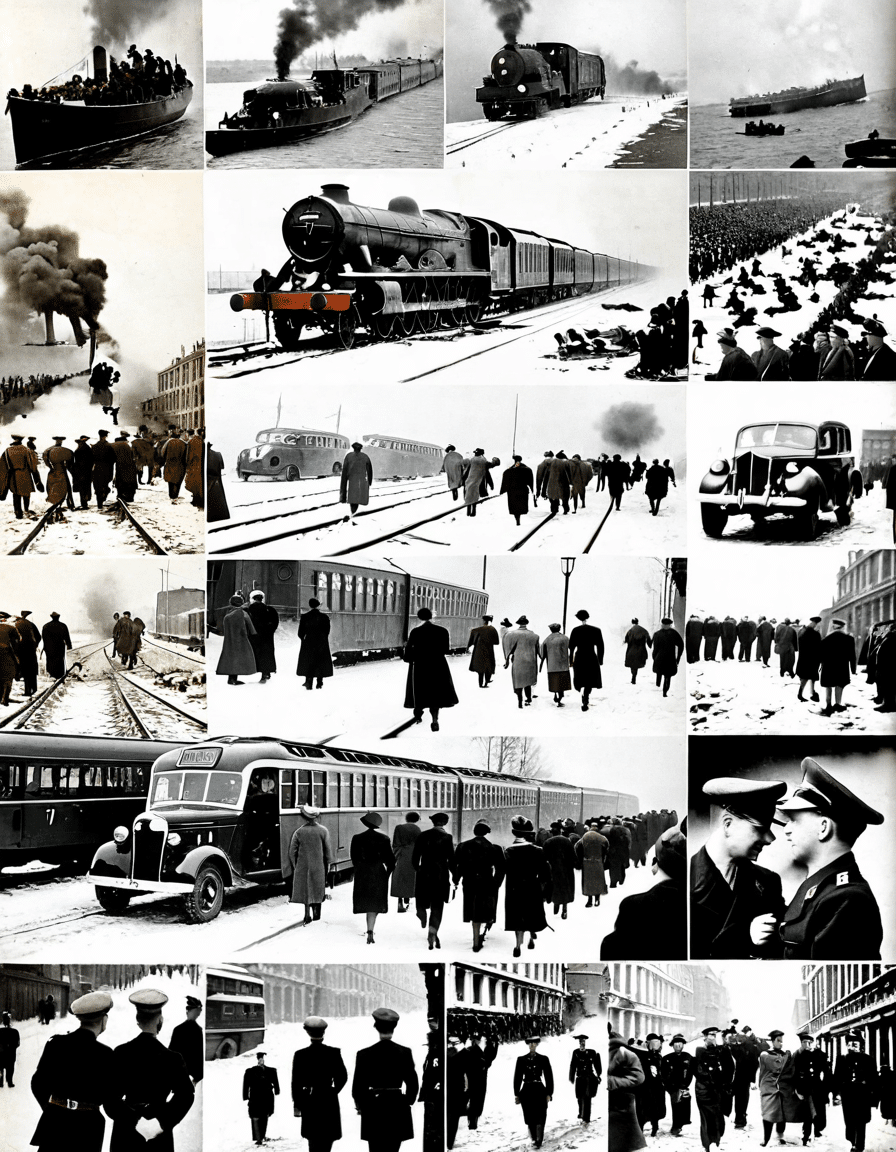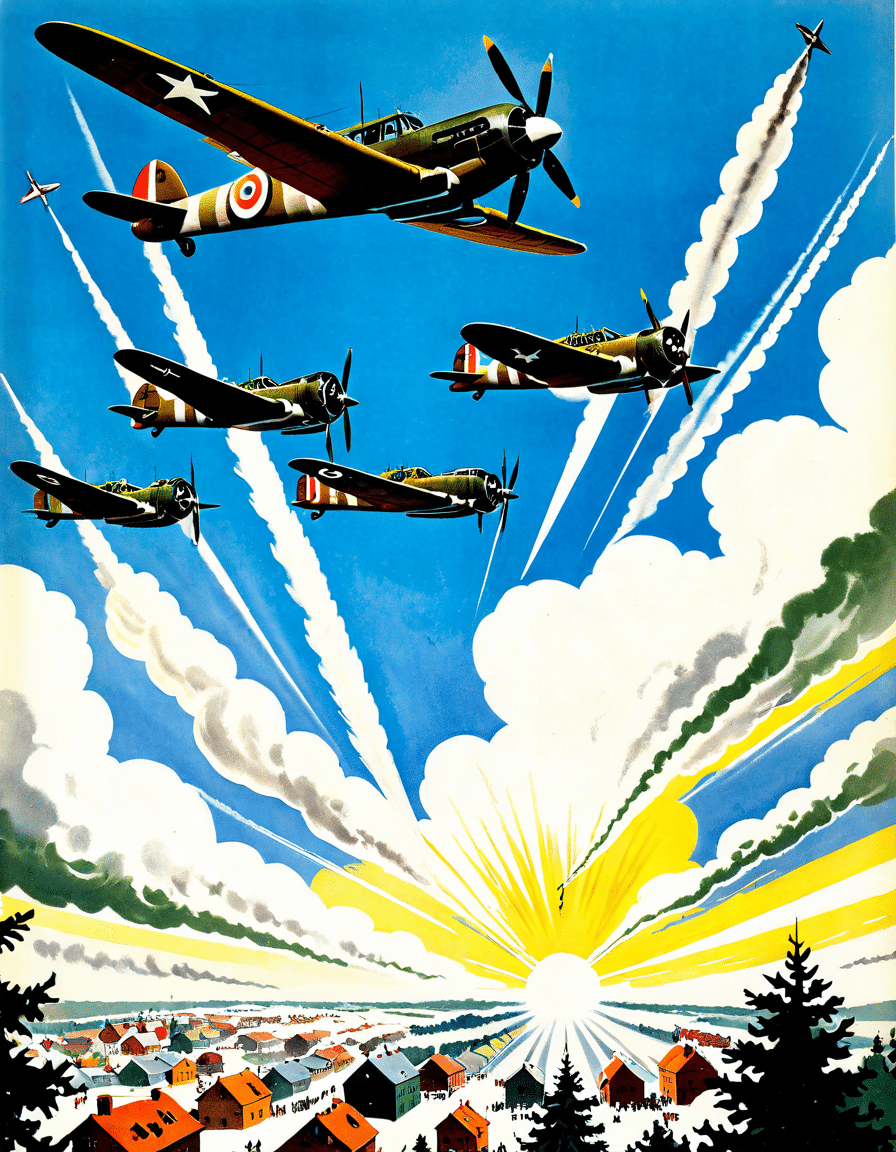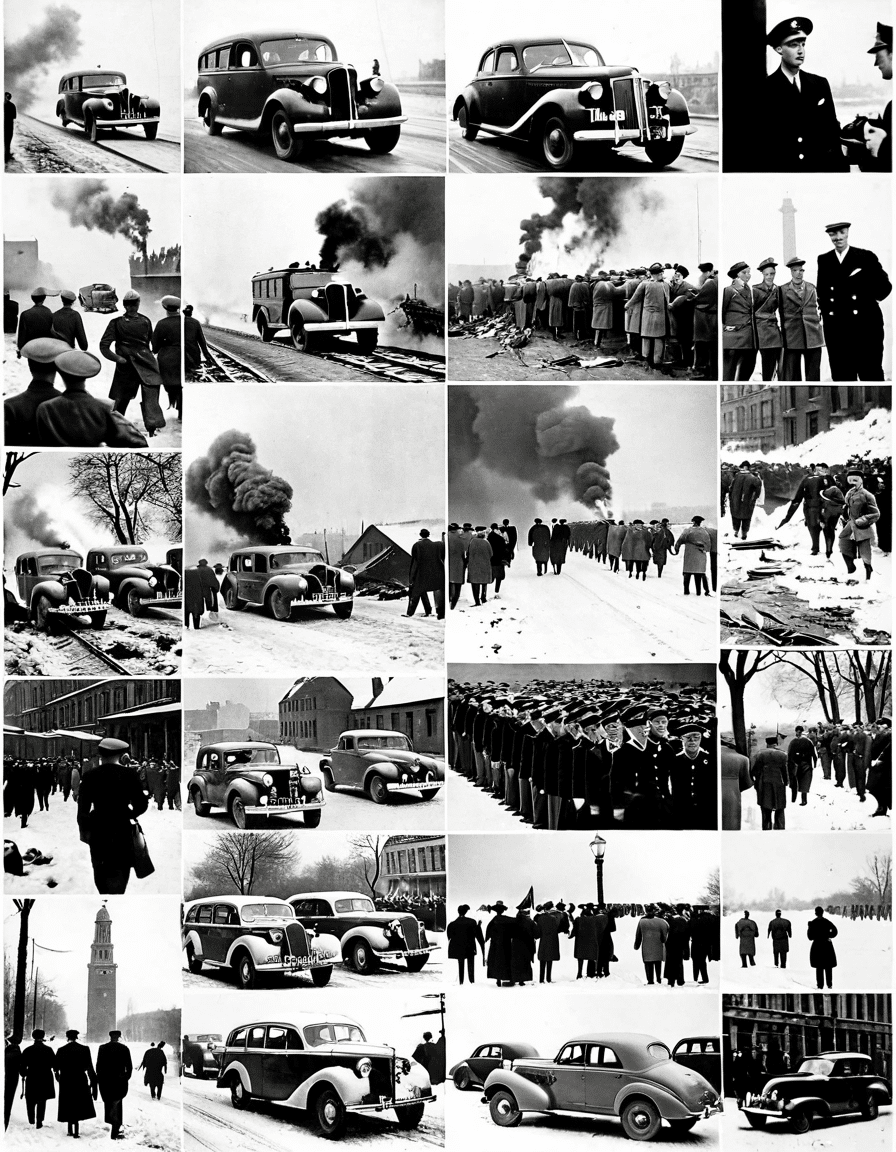December 7, 1941, remains engraved in history as the day that dramatically altered the course of the United States and the world. The surprise attack on Pearl Harbor by Japan marked the U.S. entry into World War II, igniting a series of events that would reshape global dynamics. This article explores the multifaceted ramifications of that momentous day while shedding light on lesser-known historical details, aiming to provide a comprehensive understanding of why this day is so significant in American and world history.
7 Key Events That Shaped December 7, 1941

1. The Attack on Pearl Harbor
On the morning of December 7, 1941, waves of Japanese planes targeted the United States naval base at Pearl Harbor in Hawaii. This sudden assault resulted in the deaths of approximately 2,400 Americans, alongside damaging or destroying 20 naval vessels and nearly 200 aircraft. The attack was a wake-up call for a nation caught in a web of isolation, shaping public opinion against Japan and making a push for war almost inevitable.
2. The Wake-Up Call for America
Before this fateful day, many Americans held strong isolationist views, favoring non-involvement in international conflicts. However, the shocking reality of Pearl Harbor shattered this mindset, revealing glaring inadequacies in military readiness and strategy. In mere hours, a country previously divided over its involvement in World War II became unified in a fervent commitment to resist any forms of foreign aggression.
3. The Declaration of War
The day after the attack, President Franklin D. Roosevelt made his solemn address to Congress, famously designating December 7 as “a date which will live in infamy.” His declaration of war against Japan marked a definitive turning point not just for the United States, but for the world, leading to a massive mobilization of troops and resources, aimed at confronting the Axis powers head-on.
4. Repercussions on U.S. Foreign Policy
December 7, 1941, catalyzed a dramatic shift in U.S. foreign policy from isolationism to interventionism. No longer neutral, the U.S. aligned firmly with Allied nations like Great Britain and the Soviet Union, fostering new alliances while confronting the Axis powers. This pivot not only altered the trajectory of the war but also established a fresh global order in the post-war world.
5. Impact on Civil Rights and Japanese American Internment
The aftermath of Pearl Harbor led to Executive Order 9066, resulting in the internment of nearly 120,000 Japanese Americans, a decision driven by fear and prejudice. This period witnessed significant civil rights violations and raises ongoing discussions about the balance between national security and civil liberties. This sobering chapter echoes within today’s conversations around immigration and security, making it imperative to remember these past injustices.
6. Cultural Representations of December 7
The legacy of December 7, 1941, extends into popular culture, with various films and documentaries immortalizing the events of Pearl Harbor. From “Tora! Tora! Tora!” to “Pearl Harbor,” these works often highlight American heroism while glossing over the intricacies of war. While these representations maintain historical interest, it’s crucial to engage with the deeper realities and narratives of those who lived through those times.
7. Modern Reflections: Understanding January 6 and Other Critical Days
Examining December 7, 1941, in conjunction with January 6, 2021, reveals a striking pattern of national crises arising from perceived threats. The storming of the Capitol serves as a modern reflection of the vulnerabilities that the nation faces today. Understanding how December 7 shaped American resilience enriches discussions about national identity, unity, and the responsibilities of citizenship.
The Broader Impact: December 7 in Historical Context
The significance of December 7, 1941, goes far beyond the immediate devastation of the attack. It warrants examination alongside other notable historical dates that have influenced the trajectory of the United States. For instance, April 22 sealed the introduction of landmark legislation that transformed American armed forces, while April 24 represents contributions to military tactics that still prompt discussions today. The February 19 holiday commemorates the signing of Executive Order 9066, intertwining civil liberties with wartime policies that continue to provoke controversy.
Earlier dates, like April 22, also laid the groundwork for America’s military engagements, while March 7 often slips under the radar, yet serves as a reminder of the persistent evolution of American society in both war and peace. Acknowledging these moments contributes to our understanding of resilience and national unity, as they illustrate the changes prompted by conflict and the ceaseless calls for justice.

Reflecting on the Legacy of December 7
As we reflect on December 7, 1941, more than eighty years later, the day stands as a powerful testament to the fragility of peace. It emphasizes the often-complex interplay between military action and socio-political repercussions. The challenges surrounding democracy, national security, and civil rights are as urgent today as they were back then. Engaging with the consequences of December 7 serves as both a cautionary tale and a rallying call for meaningful dialogue, ensuring that sacrifices made in the past are neither overlooked nor easily repeated.
As we analyze responses to crises like the recent Kerala Nipah virus outbreak or shifts in societal attitudes evident in conversations surrounding individuals like joe swash or ken Griffey sr, it becomes clear that the lessons from December 7 permeate broader discussions about who we are as a nation. Understanding this history not only enriches our comprehension of past events but also informs our path forward in navigating the complexities of modern society.
In many ways, December 7, 1941, continues to resonate in contemporary culture, impacting narratives found in entertainment, policies, and ongoing movements for social justice. Just as Mave Kpop has captured the world’s attention through its cultural influence, the tragic story of December 7 persists as a vital part of our collective memory. Let’s not forget, learning from our history equips us to face future challenges with vigilance and unity.
December 7 1941: Trivia and Interesting Facts
The Attack and Its Impact
December 7, 1941, is infamous for the surprise military strike launched by the Japanese against the U.S. naval base at Pearl Harbor in Hawaii. This event not only led the United States to join World War II but also marked a significant shift in global geopolitics. Interestingly, this attack was the catalyst for several substantial changes within American society, paving the way for advancements in technology and military strategy. By the end of the war, the U.S. emerged as a global superpower, much like how your favorite stars or influencers, like Joe Swash, have risen to fame in their own right, contributing to culture and entertainment, and even impacting public figures with their impressive earnings—Joe Swash ‘s net worth being a hot topic of interest.
The Ripple Effect on American Life
The attack on Pearl Harbor rallied the nation, leading to a surge in enlistment and a generation determined to defend freedom. During this period, many were looking for ways to contribute to the war effort, and women found new roles in the workforce, taking jobs that had traditionally been held by men. It’s fascinating to think that something so catastrophic fueled not just war efforts, but also social change. There’s a parallel here with modern ways to make an impact, including promotions and sales like those at Pretty Little Thing, where shoppers can feel empowered while getting a good deal!
A Glimpse into Aftermath and Culture
In the wake of the attack, not only did countless movies and books depict the emotional aftermath, but it also led to a host of documentaries and discussions about military tactics and strategy. As folks planned for the future of sports, major events like the upcoming French Open 2025 schedule became a focus for those looking to escape from the harsh realities of wartime. The narrative shaped around December 7, 1941, is still relevant today, influencing storytelling in various formats and showcasing societal responses to crisis.
America’s resilience during this tumultuous time even paved the way for artistic expressions from figures like Chelsea Winstanley, reflecting on the human condition and perseverance during difficult times. In the same vein, many celebrities, like Diddy, have reinvented themselves over the years, and one might wonder—Where Is Diddy now? Just as December 7, 1941, marked a significant turning point, so too do individuals redefine themselves in the face of life’s challenges. This day resonates through history, encapsulating not just a moment in time, but an ongoing narrative of courage and change.

What is significant about December 7th, 1941?
December 7th, 1941, is significant because it marks the day Japan launched a surprise attack on Pearl Harbor, drawing the United States into World War II and changing the course of history.
What are three reasons why Japan attacked Pearl Harbor?
Japan attacked Pearl Harbor for three main reasons: to eliminate the U.S. Pacific Fleet’s ability to oppose Japanese expansion, to secure access to natural resources in Southeast Asia, and to bolster Japanese morale by delivering a decisive blow against a major power.
What happened on December 7 1941?
On December 7, 1941, Japanese forces executed a surprise military strike against the U.S. naval base at Pearl Harbor in Hawaii, resulting in significant damage to the U.S. fleet and leading to the United States’ formal entry into World War II.
How many died in Pearl Harbor?
About 2,400 Americans died as a result of the attack on Pearl Harbor, including military personnel and civilians.
Did America bomb Japan after Pearl Harbor?
Yes, America did bomb Japan after Pearl Harbor. The most notable bombing was the Doolittle Raid in April 1942, which targeted Tokyo and other areas.
How many ships are still sunk at Pearl Harbor?
As of now, nine Japanese ships remain sunk at Pearl Harbor, serving as a historic reminder of the attack.
Would the US have entered WWII without Pearl Harbor?
It’s hard to say for sure, but many historians believe the U.S. would have eventually entered World War II, as tensions were rising with Germany and Japan prior to the attack on Pearl Harbor.
What did the code Tora Tora Tora mean to the Japanese forces?
“Tora Tora Tora” meant “Tiger, Tiger, Tiger,” signaling that the Japanese had achieved complete surprise over the U.S. forces at Pearl Harbor.
Why did Japan invade Hawaii?
Japan didn’t invade Hawaii; they launched a surprise attack on Pearl Harbor to cripple the U.S. military presence in the Pacific but had no intention or capability to occupy Hawaii.
How many survivors from Pearl Harbor are still alive?
As of now, the number of Pearl Harbor survivors still alive is estimated to be fewer than 100, given that many of them are in their late 90s or older.
What are some fun facts for December 7th?
Fun facts about December 7th include it being the anniversary of the Pearl Harbor attack, as well as being recognized as National Pearl Harbor Remembrance Day in the United States.
How long is December 7 from now?
December 7th is just a few weeks away from now, falling exactly 54 days from today, marking the anniversary of an important historical event.
What was Hitler’s reaction to Pearl Harbor?
Hitler’s reaction to Pearl Harbor was one of opportunism; he declared war on the United States shortly after, seeing the attack as a chance to strengthen Germany’s position in the war.
How many bodies are still trapped in Pearl Harbor?
Several bodies are still trapped in the wrecks at Pearl Harbor, although exact numbers aren’t reported, and efforts have been made over the years to recover remains.
What did the Japanese admiral say after attacking Pearl Harbor?
After the attack on Pearl Harbor, Japanese Admiral Isoroku Yamamoto famously said, “I fear all we have done is to awaken a sleeping giant,” reflecting on the inevitable U.S. response.
What is special about the 7th of December?
December 7th is special not only because of the attack on Pearl Harbor but also because it serves as a day of remembrance for those who fought and lost their lives in that event.
Why December 7th 1941 was a day that would live in infamy?
December 7th, 1941, is called a day that would live in infamy because President Franklin D. Roosevelt described it in his speech following the attack, signaling the start of America’s commitment to fight in World War II.
Why was there not a third strike by the Japanese at Pearl Harbor?
The Japanese did not carry out a third strike at Pearl Harbor primarily due to a lack of time, fuel, and a change in strategy, focusing instead on consolidating their gains in the Pacific.
Why did the Japanese Empire bomb Pearl Harbor on December 7th, 1941?
Japan bombed Pearl Harbor on December 7th, 1941, as part of their strategy to cripple the U.S. fleet and prevent interference in their military operations across Southeast Asia.



